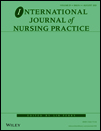Effect of cryotherapy on paclitaxel-induced peripheral neuropathy of the hand in female breast cancer patients: A prospective self-controlled study
Abstract
Aims
The purpose of this study was to examine the efficacy of cryotherapy with frozen gloves for the prevention of the chemotherapy-induced peripheral neuropathy of the hand.
Background
Most breast cancer patients receive chemotherapy; consequently, patients frequently experience adverse effects of chemotherapy-induced peripheral neuropathy.
Methods
A quasi-experimental and prospective self-controlled study was conducted. Breast cancer patients wore frozen glove on the dominant hand for 90 min during their weekly treatment with paclitaxel (80 mg/m2). Treatment of the dominant hand, the intervention group, was continued for 12 weeks. The non-dominant hand was considered the control group.
Results
A total of 22 patients participated in this study, and only one patient did not reach the cumulative dose (960 mg/m2). Findings show that the incidences of sensory and motor symptoms of chemotherapy-induced peripheral neuropathies at the following times (Time 1 to Time 4) were significantly lower in the intervention group than in the control group. However, although the incidences of motor symptoms were lower in the experimental group than in the control group, a significant difference was shown only at Time 4. Additionally, both groups of patients reported that their incidence of sensory symptoms were higher than those of motor symptoms.
Conclusion
Cryotherapy with frozen gloves is useful in reducing both the sensory and motor symptoms of the chemotherapy-induced peripheral neuropathy of the hands.
Summary statement
- Most breast cancer patients receive chemotherapy; consequently, patients frequently experience adverse effects of the chemotherapy-induced peripheral neuropathy.
- Previous studies have indicated that cryotherapy (frozen gloves or shocks) may effectively reduce chemotherapy-induced peripheral neuropathy associated with the use of paclitaxel. However, there is limited evidence for the effective treatment of chemotherapy-induced peripheral neuropathy.
- Paclitaxel-induced peripheral neuropathy is frequently observed in patients with breast cancer and cryotherapy may effectively reduce this.
- The study results show that cryotherapy with frozen gloves can effectively alleviate the sensory and motor symptoms of the hands in breast cancer patients during chemotherapy.
- Moreover, we also found that breast cancer patients reporting sensory symptoms had higher motor symptoms during treatment with paclitaxel.
- Cryotherapy is a simple, safe, and effective strategy to prevent chemotherapy-induced peripheral neuropathy in patients with breast cancer who receive paclitaxel treatment.
- Moreover, a reduction in group effects may increase the willingness of patients to receive chemotherapy.
CONFLICT OF INTEREST
None declared.
Open Research
DATA AVAILABILITY STATEMENT
The raw data that support the findings of present study are available on reasonable request from corresponding author.




